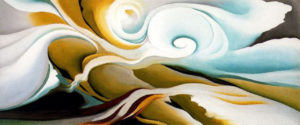
As I write this, we have not yet begun to celebrate Passover, and my household is bursting with anticipation.
My middle son is hilariously attempting to sell our chametz to the babysitter, my youngest child has taken our cockatiel’s molted feathers to task around the house, and my oldest son is planning the seating arrangements for our first seder in Atlanta. What could be more fun than moving every piece of furniture out of the living room? There is singing, bickering, cooking and bargaining going on, all at the same time. It is pure chaos and pleasure.
Over the years, I have learned that the excitement of our fast-paced life often causes me a great deal of anxiety. My nervous system is not as strong as it used to be, and I easily get overwhelmed, especially if my vision for how things should unfold is not met by reality.
I can relate to the description of modern-day life by Jon Kabat-Zinn, a scientist and meditation teacher, who calls it “full catastrophe living.” What he means by catastrophe living is the amount of energy we often waste on stress and the painful disappointments we carry because of our inflexible attitudes toward the challenges of life.
Let’s be honest: As much as we love the Jewish holidays and our families, planning for Passover, especially if you are hosting a seder, is hard work, no matter how much or how little you observe the holiday. Because it requires a great deal of coordination, negotiation and preparation, it becomes a microcosm for how we approach our life in general.
What is sometimes lost in the burst of energy that Passover requires is that we are preparing for something much greater. The space we enter after Passover, textually speaking, is the wilderness of the desert. After the narrative of our miraculous escape from Egypt, we find ourselves lost and not knowing the way. What is the purpose of our wandering? What are we seeking?
We have the narrative of our post-slavery ancestors, who were rebellious, ungrateful and undisciplined. They generally behaved as people do when they are desperately afraid of uncertainty.
Despite their impatience and fear, they did not wander the desert in vain and were met with the mind-blowing experience of seeing G-d, with all of the intensity of being in the intimate presence of the divine. There is a midrash that tells us that the experience lasted just a moment, for people began to faint.
Some sages say they fainted upon hearing the first word G-d uttered, Ani, or I (in “I am your G-d”). My favorite explanation is that it was enough to hear the first letter, aleph, which is silent. Thus, it was in the awesomeness of the silence that the Israelites knew the divine.
One of my beloved teachers often drilled into his students that Torah is not journalism; it is a complex literary work about the inner workings of the soul and what it means to be human. Whether you believe that our ancestors experienced revelation at Sinai or not, the idea of human encounter with the divine is a profound part of the Jewish tradition. And our celebration of Passover is ultimately a spiritual preparation for the festival of Shavuot, the re-enactment of that encounter.
Gunilla Norris, a teacher on universal meditation practices, writes: “Within each of us there is a silence — a silence as vast as the universe. We are afraid of it … and we long for it. When we experience that silence, we remember who we are … creatures created from silence.”
In the rush of the Passover holiday, the exhaustion of the end of the school year, the transition from the slumber of winter to the toil of spring, I invite you to sit and rest into silence. We have 49 days until the festival of Shavuot, rarely celebrated in many parts of the Jewish community. Observant Jews will count the days with special prayers.
If this is unfamiliar to you, or if it is not in your practice, try wandering into silence. It is in silence that we might find the divine essence we seek.
Try it. Tell me what happens.